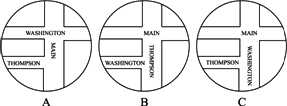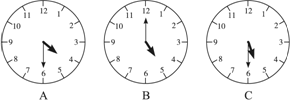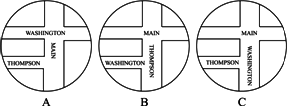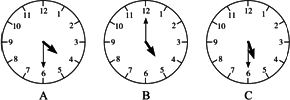
题目列表(包括答案和解析)
The dirty, homeless man sat on the pavement, staring at the atones. He thought back more than twenty years to when he was a boy living in a small red brick house on this very street. He recalled the flower garden, the swing his dad made, and the bike he had saved up for months to buy.
The man shrugged impatiently, for the brightness of those pictures hurt him, and his memory travelled on another ten years. He had a job by then, plenty of friends and started to come home less. He did not really want to remember those years, nor the day when, because o' debts, he had gone home planning to ask for money. He felt embarrassed, but he knew exactly where his dad kept the money. When his parents stepped out of the room, he took what he wanted and left.
That was the last time he had seen them. Ashamed, he went abroad, and his parents knew nothing about the years of wandering or time in prison. But locked in his cell he often thought of home. Once free, he would love to see his parents again, if they were still alive, and still wanted to see him.
When his prison time was up, he found -a job, but couldn't settle. Something was drawing him home. He did not want to arrive penniless, so he hitchhiked most of the long journey back. But less than a mile from his destination he started to feel sick with doubt. Could they ever accept this man who had so bitterly disappointed them?
He spent most of that day sitting under a tree. That evening he posted a letter which, although short, had taken him hours to write. It ended with:
I know it is unreasonable of me to suppose you want to see me ... so it's up to you. I'll come early Thursday morning. If you want me home, hang a white handkerchief in the window of my old bedroom. If it's there, I'll come in; if not, I'll wave good-bye and go.
And now it was Thursday morning and he was sitting on the pavement at the end of the street. Finally he got up and walked slowly toward the old house. He drew a long breath and looked.
His parents were taking no risks. ________________________________________________
_______________________________________________________________________________
The man threw his head back, gave a cry of relief and ran straight through the open front door.
36. Why did the man shrug impatiently (paragraph 2) while he was thinking of his childhood?
A. The thoughts made him angry.
B. He felt he had wasted time.
C. He was anxious to go home.
D. The sweet memory caused him much pain.
37.Why did it take him hours to write the letter?
A. He doubted if his parents still lived in that house.
B. He had much news to tell his parents.
C. He felt ashamed to ask for forgiveness.
D. He was longing to return home and felt excited.
38. In what order did the following events take place?
a. He took the money from his parents.
b. He bought a bicycle with his savings.
c. He was sentenced to prison.
d. He wrote the letter home.
e. He sat on the pavement.
f. He hitchhiked back home.
A. b, a, c, d, e, f B. b, a, c, f, d, e
C. a, c, b, d, f, a D. a, d, b, c, e, f
39.Which of the following best fits into paragraph 8 ?
A. Every inch of the house was covered in white. Sheets, pillowcases and table clothes had been placed on every window and door, making it look like a snow house.
B. The house before him was just as he remembered: the red bricks, the brown door and nothing else.
C. A colourful blanket was over the front door. On it, in large letters, was written, "Welcome home, son
D. A police car was parked in the drive way, and two officers stood at the front door.
40.The best title of the passage is _______.
A. Sweet Memory B. White Handkerchief
C. Abandoned Son D. Leaving Home
| |||||||||||||||||||||||||||||||||||||||||||||||||||||||||||||||||||||||||
听力(共两节,满分35分)
第一节:听独白或对话(共15小题;每小题2分,满分30分)
听下面5段对话或独白。每段对话或独白后有几个小题,从题中所给的A、B、C三个选项中选出最佳选项。听每段对话或独白前,你将有时间阅读各个小题,每小题5秒钟;听完后,各小题将给出5秒钟的作答时间。每段对话或独白读两遍。
听第1段对话,回答第1~3题。
1.Which of the following shows the right direction?

2.Which of the following may be the building the woman referred to?

3.At what time does the shop close?

听第2段对话,回答第4~6题。
4.Where did the man go this morning?
A.His own garden.
B.A playground.
C.The Summer Palace.
5.Did the man often go there early in the morning in the past?
A.No, this is the first time for him.
B.Yes, often.
C.No, only several times.
6.Who did the man see sitting under a tree?
A.Two old women.
B.Two old men.
C.Two young girls.
听第3段独白,回答第7~9题。
7.What can we learn about North Dakota?
A.A block party is an early sign of summer there.
B.Indoor sports are popular there in winter.
C.Winter snows are usually deep there.
8.What do the people in North Dakota think of the season of winter?
A.Quiet and satisfying.
B.Long and dull(乏味).
C.Short but exciting.
9.Which of the following is true?
A.People in North Dakota like answering questions.
B.People in North Dakota have various(各种各样的)interests.
C.People in Ninth Dakota dislike answering questions.
听第4段独白,回答第10~12题。
10.Which of the following facts that does NOT make it easy for the mother to take care of the business?
A.She helped the father with the business before.
B.She looked after the children.
C.The speaker’s older brother was helping with the business.
11.When did the mother probably start to take care of the business?
A.Recently.
B.Six years ago.
C.Two years ago.
12.Who was George?
A.My younger brother.
B.My elder brother.
C.My father.
听第5段对话,回答第13~15题。
13.Where is the man calling?
A.A train station.
B.A park.
C.A theatre.
14.What are the prices of the tickets he wants?
A.$3.50.
B.$5.
C.$7.50.
15.What time does he have to collect the tickets?
A.Before 7∶50.
B.Before 7∶45.
C.Before 7∶15.
第二节:听取信息(共5小题;每小题1分,满分5分)
听下面1段对话,请根据题目要求,从听到的内容中获取必要的信息。听录音前,你将有10秒钟的阅题时间,录音读两遍。你有80秒钟的作答时间。

听力(共两节,满分35分)
第一节:听独白或对话(共15小题;每小题2分,满分30分)
听下面5段对话或独白。每段对话或独白后有几个小题,从题中所给的A、B、C三个选项中选出最佳选项。听每段对话或独白前,你将有时间阅读各个小题,每小题5秒钟;听完后,各小题将给出5秒钟的作答时间。每段对话或独白读两遍。
听第1段对话,回答第1~3题。
1.Which of the following shows the right direction?

2.Which of the following may be the building the woman referred to?

3.At what time does the shop close?

听第2段对话,回答第4~6题。
4.Where did the man go this morning?
A.His own garden.
B.A playground.
C.The Summer Palace.
5.Did the man often go there early in the morning in the past?
A.No, this is the first time for him.
B.Yes, often.
C.No, only several times.
6.Who did the man see sitting under a tree?
A.Two old women.
B.Two old men.
C.Two young girls.
听第3段独白,回答第7~9题。
7.What can we learn about North Dakota?
A.A block party is an early sign of summer there.
B.Indoor sports are popular there in winter.
C.Winter snows are usually deep there.
8.What do the people in North Dakota think of the season of winter?
A.Quiet and satisfying.
B.Long and dull(乏味).
C.Short but exciting.
9.Which of the following is true?
A.People in North Dakota like answering questions.
B.People in North Dakota have various(各种各样的)interests.
C.People in Ninth Dakota dislike answering questions.
听第4段独白,回答第10~12题。
10.Which of the following facts that does NOT make it easy for the mother to take care of the business?
A.She helped the father with the business before.
B.She looked after the children.
C.The speaker’s older brother was helping with the business.
11.When did the mother probably start to take care of the business?
A.Recently.
B.Six years ago.
C.Two years ago.
12.Who was George?
A.My younger brother.
B.My elder brother.
C.My father.
听第5段对话,回答第13~15题。
13.Where is the man calling?
A.A train station.
B.A park.
C.A theatre.
14.What are the prices of the tickets he wants?
A.$3.50.
B.$5.
C.$7.50.
15.What time does he have to collect the tickets?
A.Before 7∶50.
B.Before 7∶45.
C.Before 7∶15.
第二节:听取信息(共5小题;每小题1分, 满分5分)
听下面1段对话,请根据题目要求,从听到的内容中获取必要的信息,填入标号为16~20的空格中。听录音前,你将有10秒钟的阅题时间,录音读两遍。你有80秒钟的作答时间。

| |||||||||||||||||||||||||||||||||||||||||||||||||||||||||||||||||||||||||
湖北省互联网违法和不良信息举报平台 | 网上有害信息举报专区 | 电信诈骗举报专区 | 涉历史虚无主义有害信息举报专区 | 涉企侵权举报专区
违法和不良信息举报电话:027-86699610 举报邮箱:58377363@163.com